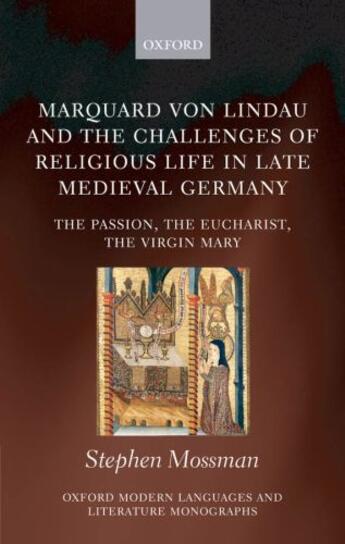-
Nombre de pages : (-)
-
Collection :
(-)
-
Genre :
(-)
-
Thème :
Non attribué
-
Prix littéraire(s) :
(-)
Résumé:
This is a study of the intellectual history and religious culture of German-speaking Europe in the late Middle Ages. Its focus is the bilingual oeuvre of the Franciscan friar Marquard von Lindau (d. 1392), arguably the most widely-read author in the German language before the Reformation. His... Voir plus
This is a study of the intellectual history and religious culture of German-speaking Europe in the late Middle Ages. Its focus is the bilingual oeuvre of the Franciscan friar Marquard von Lindau (d. 1392), arguably the most widely-read author in the German language before the Reformation. His most successful works were those in which he considered pragmatic issues of Christian life, aimed at a broad reading public that stretched from monks and nuns living the contemplative life in enclosed convents; to his confreres, novices and students in the mendicant orders; and the literate citizens of the burgeoning mercantile centres. It is three of these pragmatic issues, central to late medieval religious life, around which this book is structured: the Passion of Christ, the sacrament of the Eucharist, and the devotion to the Virgin Mary. The dominant approaches taken towards each of these in the fourteenth-century church represented problematic challenges to Marquard; challenges which he met in a distinctive and influential manner, by no means in accordance with the affectively-charged devotional practices encouraged by many within and without his order, and so often considered normative for late medieval religious culture. The original voice with which Marquard spoke is made clear through the location of his oeuvre within the pan-European context of the debates in which his works participate. The ethos his works projected redetermined the trajectory of intellectual life in Germany into the fifteenth century and beyond.
Donner votre avis














